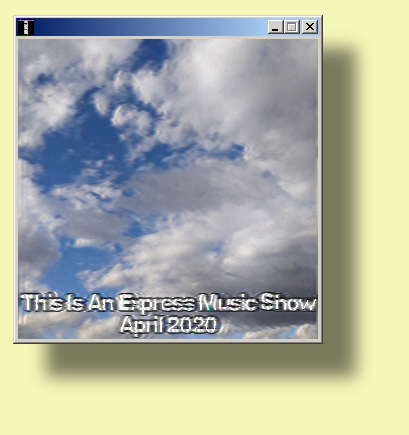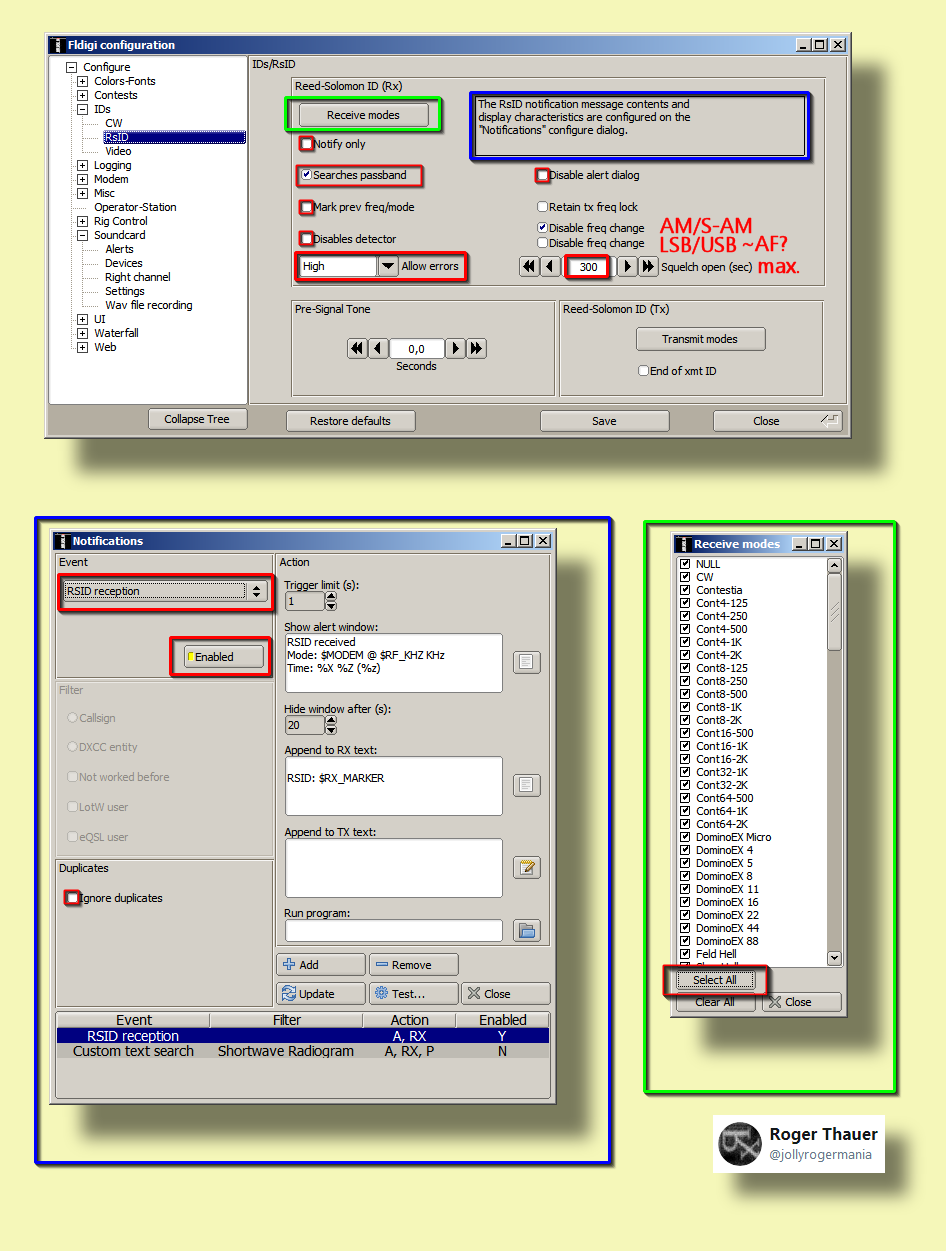http://www.rhci-online.net/radiogram/radiogram.htm
RSID: <<2020-04-05T01:30Z MFSK-64 @ 5960000+1500>>
http://www.rhci-online.net/radiogram/radiogram.htm
RSID: <<2020-04-05T01:30Z MFSK-64 @ 5960000+1500>>
Agnetha Fältskog of ABBA was born April 5, 1950.
Sending Pic:217x210;

abbasite.com
Please report your decode to
themightykbc@gmail.com
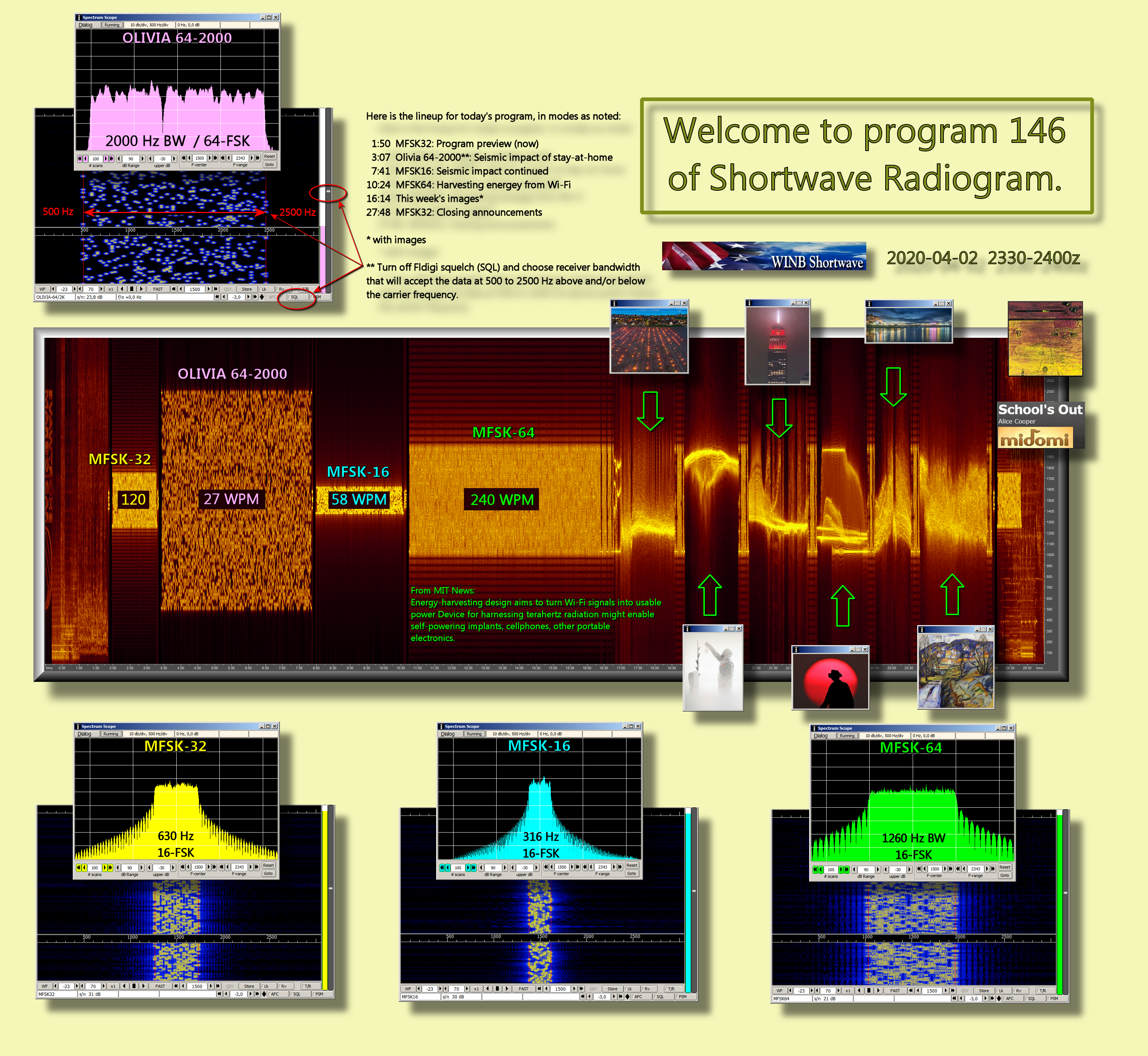
RSID: <<2020-04-02T23:31Z
MFSK-32 @
9265000+1500>>
Welcome to program 146 of Shortwave Radiogram.
I'm Kim Andrew Elliott in Arlington, Virginia USA.
Here is the lineup for today's program, in modes as noted:
1:50 MFSK32: Program preview (now)
3:07 Olivia 64-2000**: Seismic impact of stay-at-home
7:41 MFSK16: Seismic impact continued
10:24 MFSK64: Harvesting energey from Wi-Fi
16:14 This week's images*
27:48 MFSK32: Closing announcements
* with images
** Turn off Fldigi squelch (SQL) and choose receiver bandwidth
that will accept the data at 500 to 2500 Hz above and/or below
the carrier frequency.
Please send reception reports to
radiogram@verizon.net
And visit http://swradiogram.net
Twitter:
@SWRadiogram
Shortwave Radiogram now changes to Olivia 64-2000 ...
RSID: <<2020-04-02T23:33Z
OL 64-2K @
9265000+1500>>
This is Shortwave Radiogram in Olivia 64-2000
Scientists Report Coronavirus Shutdowns Have Reduced Seismic
'Noise'
VOA News
31 March 2020
Researchers who study Earth's movements say mandatory shutdowns
of transportation systems and other human activities as a result
of the coronavirus pandemic has resulted in a drop in what they
call seismic "noise" around the world.
An article published Tuesday in the scientific research journal
Nature explains that human activity, such as moving vehicles and
industrial machinery, can move Earth's crust the way earthquakes
and volcanic activity do. And researchers say the lack of such
human activity in recent days has made a significant difference.
Article continues in MFSK16 ...
RSID: <<2020-04-02T23:37Z MFSK-16 @ 9265000+1500>>
This is Shortwave Radiogram in MFSK16
Royal Observatory of Belgium seismologist Thomas Lecocq says
vibrations caused by human activity have dropped by one-third
since coronavirus containment measures were introduced in that
country.
Researchers at the California Institute of Technology reported a
similar drop in the Los Angeles area, as did researchers in
Britain.
Nature reports the reduced human-generate "noise" has allowed
scientists to get more accurate and sensitive readings regarding
earthquake aftershocks in urban areas that might otherwise go
undetected.
The researchers say this also allows for the study of more subtle
vibrations, such as those generated by ocean waves crashing,
which help when probing the Earth’s crust.
bit.ly/2UxmUSO
Changing to MFSK64 ...
RSID: <<2020-04-02T23:40Z MFSK-64 @ 9265000+1500>>
This is Shortwave Radiogram in MFSK64
Please send your reception report to
radiogram@verizon.net
From MIT News:
Energy-harvesting design aims to turn Wi-Fi signals into usable
power
Device for harnessing terahertz radiation might enable
self-powering implants, cellphones, other portable
electronics.
Jennifer Chu
27 March 2020
Any device that sends out a Wi-Fi signal also emits terahertz
waves —electromagnetic waves with a frequency somewhere between
microwaves and infrared light. These high-frequency radiation
waves, known as "T-rays," are also produced by almost anything
that registers a temperature, including our own bodies and the
inanimate objects around us.
Terahertz waves are pervasive in our daily lives, and if
harnessed, their concentrated power could potentially serve as an
alternate energy source. Imagine, for instance, a cellphone
add-on that passively soaks up ambient T-rays and uses their
energy to charge your phone. However, to date, terahertz waves
are wasted energy, as there has been no practical way to capture
and convert them into any usable form.
Now physicists at MIT have come up with a blueprint for a device
they believe would be able to convert ambient terahertz waves
into a direct current, a form of electricity that powers many
household electronics.
Their design takes advantage of the quantum mechanical, or atomic
behavior of the carbon material graphene. They found that by
combining graphene with another material, in this case, boron
nitride, the electrons in graphene should skew their motion
toward a common direction. Any incoming terahertz waves should
"shuttle" graphene's electrons, like so many tiny air traffic
controllers, to flow through the material in a single direction,
as a direct current.
The researchers have published their results today in the journal
Science Advances, and are working with experimentalists to turn
their design into a physical device.
"We are surrounded by electromagnetic waves in the terahertz
range," says lead author Hiroki Isobe, a postdoc in MIT's
Materials Research Laboratory. "If we can convert that energy
into an energy source we can use for daily life, that would help
to address the energy challenges we are facing right now."
Isobe's co-authors are Liang Fu, the Lawrence C. and Sarah W.
Biedenharn Career Development Associate Professor of Physics at
MIT; and Su-yang Xu, a former MIT postdoc who is now an assistant
professor chemistry at Harvard University.
Breaking graphene's symmetry
Over the last decade, scientists have looked for ways to harvest
and convert ambient energy into usable electrical energy. They
have done so mainly through rectifiers, devices that are designed
to convert electromagnetic waves from their oscillating
(alternating) current to direct current.
Most rectifiers are designed to convert low-frequency waves such
as radio waves, using an electrical circuit with diodes to
generate an electric field that can steer radio waves through the
device as a DC current. These rectifiers only work up to a
certain frequency, and have not been able to accommodate the
terahertz range.
A few experimental technologies that have been able to convert
terahertz waves into DC current do so only at ultracold
temperatures — setups that would be difficult to implement in
practical applications.
Instead of turning electromagnetic waves into a DC current by
applying an external electric field in a device, Isobe wondered
whether, at a quantum mechanical level, a material's own
electrons could be induced to flow in one direction, in order to
steer incoming terahertz waves into a DC current.
Such a material would have to be very clean, or free of
impurities, in order for the electrons in the material to flow
through without scattering off irregularities in the material.
Graphene, he found, was the ideal starting material.
To direct graphene's electrons to flow in one direction, he would
have to break the material's inherent symmetry, or what
physicists call "inversion." Normally, graphene's electrons feel
an equal force between them, meaning that any incoming energy
would scatter the electrons in all directions, symmetrically.
Isobe looked for ways to break graphene's inversion and induce an
asymmetric flow of electrons in response to incoming energy.
Looking through the literature, he found that others had
experimented with graphene by placing it atop a layer of boron
nitride, a similar honeycomb lattice made of two types of atoms —
boron and nitrogen. They found that in this arrangement, the
forces between graphene's electrons were knocked out of balance:
Electrons closer to boron felt a certain force while electrons
closer to nitrogen experienced a different pull. The overall
effect was what physicists call "skew scattering," in which
clouds of electrons skew their motion in one direction.
Isobe developed a systematic theoretical study of all the ways
electrons in graphene might scatter in combination with an
underlying substrate such as boron nitride, and how this electron
scattering would affect any incoming electromagnetic waves,
particularly in the terahertz frequency range.
He found that electrons were driven by incoming terahertz waves
to skew in one direction, and this skew motion generates a DC
current, if graphene were relatively pure. If too many impurities
did exist in graphene, they would act as obstacles in the path of
electron clouds, causing these clouds to scatter in all
directions, rather than moving as one.
"With many impurities, this skewed motion just ends up
oscillating, and any incoming terahertz energy is lost through
this oscillation," Isobe explains. "So we want a clean sample to
effectively get a skewed motion."
One direction
They also found that the stronger the incoming terahertz energy,
the more of that energy a device can convert to DC current. This
means that any device that converts T-rays should also include a
way to concentrate those waves before they enter the device.
With all this in mind, the researchers drew up a blueprint for a
terahertz rectifier that consists of a small square of graphene
that sits atop a layer of boron nitride and is sandwiched within
an antenna that would collect and concentrate ambient terahertz
radiation, boosting its signal enough to convert it into a DC
current.
"This would work very much like a solar cell, except for a
different frequency range, to passively collect and convert
ambient energy," Fu says.
The team has filed a patent for the new "high-frequency
rectification" design, and the researchers are working with
experimental physicists at MIT to develop a physical device based
on their design, which should be able to work at room
temperature, versus the ultracold temperatures required for
previous terahertz rectifiers and detectors.
"If a device works at room temperature, we can use it for many
portable applications," Isobe says.
He envisions that, in the near future, terahertz rectifiers may
be used, for instance, to wirelessly power implants in a
patient's body, without requiring surgery to change an implant's
batteries. Such devices could also convert ambient Wi-Fi signals
to charge up personal electronics such as laptops and cellphones.
"We are taking a quantum material with some asymmetry at the
atomic scale, that can now be utilized, which opens up a lot of
possibilities," Fu says.
This research was funded in part by the U.S. Army Research
Laboratory and the U.S. Army Research O?ce through the Institute
<=== ? =
ffi
https://www.compart.com/en/unicode/U+FB03
Unicode Character “ffi”
[Ligatur]
for Soldier Nanotechnologies (ISN).
http://news.mit.edu/2020/energy-harvesting-wi-fi-power-0327
This is Shortwave Radiogram in MFSK64
Please send your reception report to
radiogram@verizon.net
This week's images ...
Anti-frost candles between apricot trees near Balatonvilagos,
Hungary. From bit.ly/342opf3 ...
Sending Pic:205x174C;
A member of the Military Emergencies Unit cleans a room at the
Sant Antoni extended care facility in Barcelona. From
bit.ly/2Uy5wNU ...
Sending Pic:155x206C;
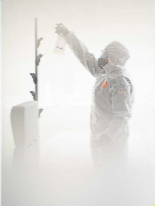
The Empire State Building in New York City is illuminated to
honor emergency workers during the coronavirus outbreak. From
wapo.st/3aCj7t9 ...
Sending Pic:169x206C;

In Kansas City, a man pauses while crossing an empty downtown
street to watch the sunset, 31 March. From
bit.ly/2XdAcpB ...
Sending Pic:202x147C;

The pier at Cromer, England. From
bbc.in/2X1HfkX ...
Sending Pic:230x92C;

Our painting of the week is "Kragerø in Spring" by Edvard Munch.
From bit.ly/2xEannI ...
Sending Pic:200x199C;

Shortwave Radiogram returns to MFSK32 ...
RSID: <<2020-03-19T23:58Z
MFSK-32 @
9265000+1500>>
This is Shortwave Radiogram in MFSK32 ...
Shortwave Radiogram is transmitted by:
WRMI, Radio Miami International, http://wrmi.net
and
WINB Shortwave, http://winb.com
Please send reception reports to
radiogram@verizon.net
And visit http://swradiogram.net
Twitter:
@SWRadiogram
I'm Kim Elliott. Please join us for the next Shortwave
Radiogram.
|
Ending music: https://www.midomi.com/index.php?action=main.track&track_id=100012199447955937&from=voice_searchAlice Cooper - School's Out |
|
Mode |
Baud |
WPM |
Duty Cycle |
BW (Hz) |
Modulation |
S/N |
ITU |
RSID-1 |
RSID-2 |
|---|---|---|---|---|---|---|---|---|---|
|
MFSK4 |
3.9 |
18 |
100.00% |
154 |
32-FSK |
|
154HF1B |
|
|
|
MFSK8 |
7.8 |
36 |
100.00% |
316 |
32-FSK |
|
316HF1B |
60 |
|
|
MFSK11 |
10.8 |
40 |
100.00% |
218 |
16-FSK |
|
218HF1B |
148 |
|
|
MFSK16 |
15.6 |
58 |
100.00% |
316 |
16-FSK |
|
316HF1B |
57 |
|
|
MFSK22 |
21.5 |
80 |
100.00% |
435 |
16-FSK |
|
435HF1B |
152 |
|
|
MFSK31 |
31.3 |
55 |
100.00% |
330 |
8-FSK |
|
330HF1B |
|
|
|
MFSK32 |
31.3 |
120 |
100.00% |
630 |
16-FSK |
|
630HF1B |
147 |
|
|
MFSK64 |
63 |
240 |
100.00% |
1260 |
16-FSK |
|
1260HF1B |
263 |
30 |
|
MFSK128 |
125 |
480 |
100.00% |
1920 |
|
|
1920HF1B |
263 |
31 |
|
MFSK64L |
63 |
240 |
100.00% |
1260 |
16-FSK |
|
1260HF1B |
263 |
30 |
|
MFSK128L |
125 |
480 |
100.00% |
1920 |
|
|
1920HF1B |
263 |
31 |
|
Mode |
Baud |
WPM |
Duty Cycle |
BW (Hz) |
Modulation |
S/N |
ITU |
RSID-1 |
RSID-2 |
|---|---|---|---|---|---|---|---|---|---|
|
OLIVIA-4-250 |
63 |
20 |
100.00% |
250 |
4-FSK |
-12 dB |
250HF1B |
75 |
|
|
OLIVIA-8-250 |
31 |
15 |
100.00% |
250 |
8-FSK |
-14 dB |
250HF1B |
69 |
|
|
OLIVIA-4-500 |
125 |
40 |
100.00% |
500 |
4-FSK |
-10 dB |
500HF1B |
74 |
|
|
OLIVIA-8-500 |
63 |
30 |
100.00% |
500 |
8-FSK |
-11 dB |
500HF1B |
72 |
|
|
OLIVIA-16-500 |
31 |
20 |
100.00% |
500 |
16-FSK |
-13 dB |
500HF1B |
70 |
|
|
OLIVIA-8-1000 |
125 |
58 |
100.00% |
1000 |
8-FSK |
- 7 dB |
1K00F1B |
116 |
|
|
OLIVIA-16-1000 |
63 |
40 |
100.00% |
1000 |
16-FSK |
-10 dB |
1K00F1B |
73 |
|
|
OLIVIA-32-1000 |
31 |
24 |
100.00% |
1000 |
32-FSK |
-12 dB |
1K00F1B |
71 |
|
|
OLIVIA-64-2000 |
? |
27 |
? |
2000 |
64-FSK |
-13 dB |
? |
? |
|
http://jontio.zapto.org/hda1/psk31-investigation.pdf
" CW@20WPM +3 db ( machine decoded by MFJ -461)
CW@20WPM +1 db ( machine decoded by fldigi or CWget )
HFpacket (300 baud ) +1 db
RTTY45 -5db
CW@20WPM -7db ( other claim like less , like -13 db *)
PSK63 -7db
FELDHell -7db
PSK31 -10 db
Olivia 64/2000 -13 db
Olivia 16/500 -14 db
WSPR -30 db ( maybe less )"
http://www.rhci-online.net/radiogram/radiogram.htm
|
QTH: |
D-06193 Petersberg (Germany/Germania) |
|
|
Ant.: |
Dipol for 40m-Band & Boomerang Antenna 11m-Band |
|
|
RX for RF: |
FRG-100B + IF-mixer & ICOM IC-R75 + IF-mixer |
|
|
Software IF: |
con STUDIO1 - Software italiano per SDR [S-AM-USB/LSB] + beta 11 Version 2.80 (August 21, 2018) - for scheduled IF-recording |
|
|
Software AF: |
Fldigi-4.0.18 + flmsg-4.0.7 images-fldigifiles on homedrive.lnk |
|
|
OS: |
German XP-SP3 with support for asian languages |
German W7 32bit + 64bit |
|
PC: |
MEDION Titanium 8008 (since 2003) [ P4 - 2,6 GHz] |
MSI-CR70-2MP345W7 (since2014) [i5 -P3560 ( 2 x 2,6GHz) ] |
http://wiki.radioreference.com/index.php/Decoding_the_SW_Radiogram_Broadcasts
https://www.qsl.net/ve7vv/Files/Digital%20Modes.pdf

RSID: <<2020-04-01T21:47Z MFSK-64 @ 7780000+1500>>

This Is A Music Show #058
01 April 2020
2100-2200UTC Wednesday on 7780 kHz
0200-0300UTC Thursday on 5850 kHz
via WRMI, Okeechobee USA
Rebroadcast on Unique Radio, Australia
1000-1100UTC Friday on 5045 kHz USB
|
***ALSO*** |
https://rnei.org/latest-updates/
Day Date
Time Frequency Target Zone |
https://rnei.org/
https://www.channel292.de/schedule-6070-khz/
----------------------------------------
PLAYLIST
Link of note:
Boards Of Canada pirate broadcasts via SWLing:
https://swling.com/blog/tag/boards-of-canada/
-----
Please send reception reports/comments:
thisisamusicshow@gmail.com
Follow TIAMS on Twitter:
www.twitter.com/ThisIsAMusicSho/
------
Thanks for listening!
--YOUR HOST--
EOM
RSID: <<2020-04-01T21:47Z
MFSK-64 @
7780000+1500>>
Sending Pic:300x300Cp4;

Buds are coming out for spring!
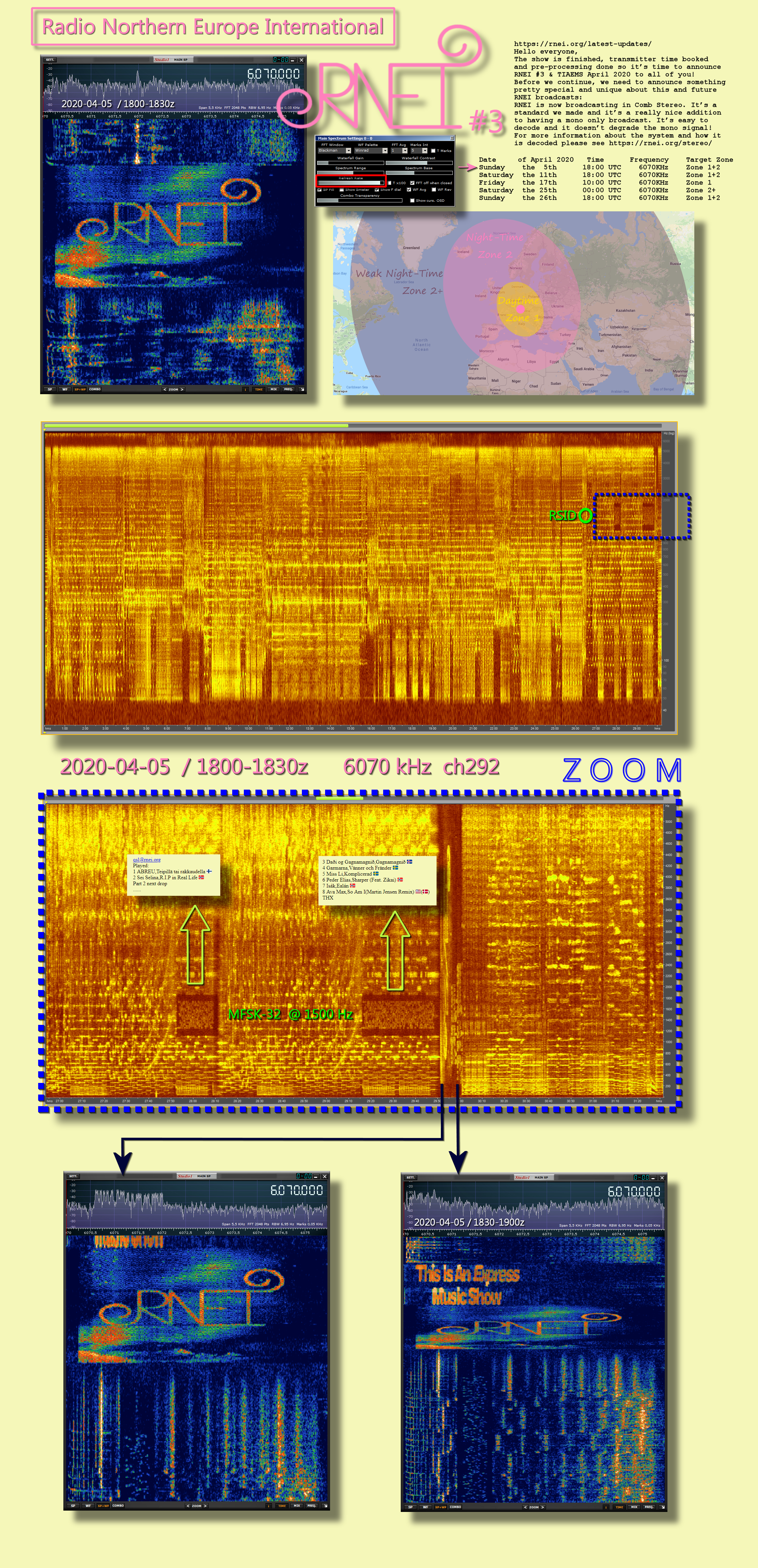
RSID: <<2020-04-05T18:26Z MFSK-32 @ 6070000+1500>>
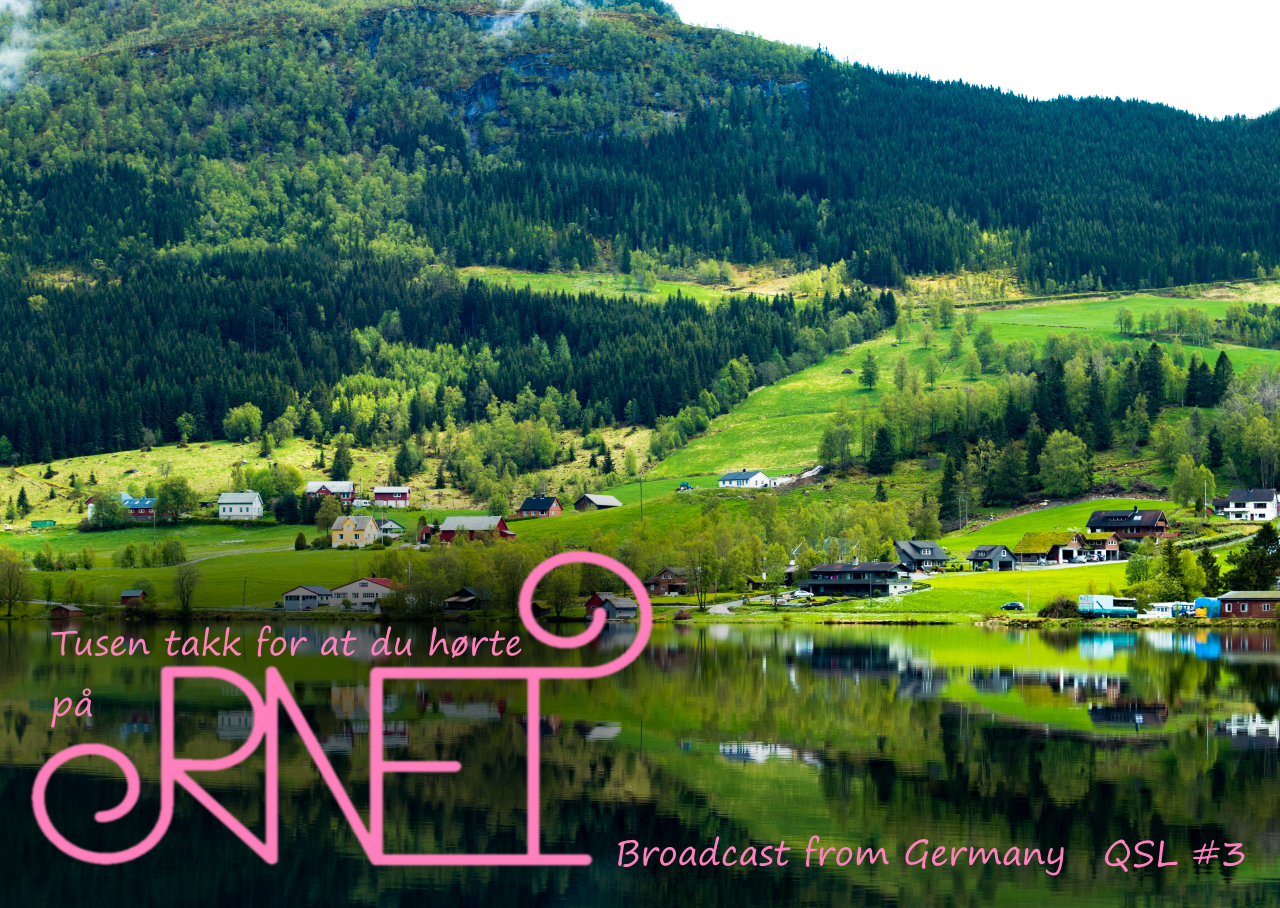
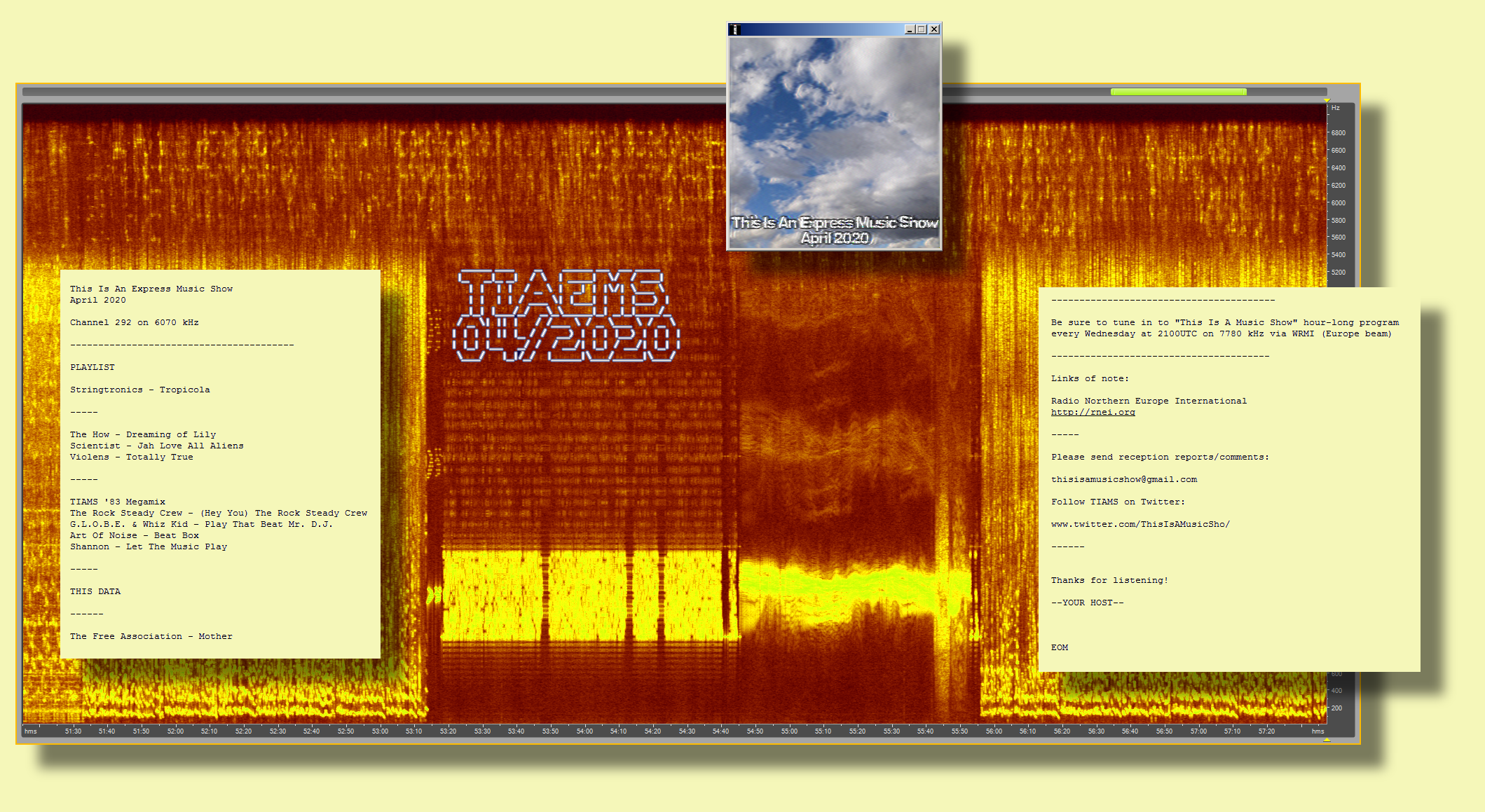
RSID: <<2020-04-05T18:53Z
MFSK-64 @
6070000+1500>>
This Is An Express Music Show
April 2020
Channel 292 on 6070 kHz
----------------------------------------
PLAYLIST
Stringtronics - Tropicola
-----
The How - Dreaming of Lily
Scientist - Jah Love All Aliens
Violens - Totally True
-----
TIAMS '83 Megamix
The Rock Steady Crew - (Hey You) The Rock Steady Crew
G.L.O.B.E. & Whiz Kid – Play That Beat Mr. D.J.
Art Of Noise - Beat Box
Shannon – Let The Music Play
-----
THIS DATA
------
The Free Association - Mother
----------------------------------------
Be sure to tune in to "This Is A Music Show" hour-long program
every Wednesday at 2100UTC on 7780 kHz via WRMI (Europe beam)
---------------------------------------
Links of note:
Radio Northern Europe International
http://rnei.org
-----
Please send reception reports/comments:
thisisamusicshow@gmail.com
Follow TIAMS on Twitter:
www.twitter.com/ThisIsAMusicSho/
------
Thanks for listening!
--YOUR HOST--
EOM
Sending Pic:300x300Cp2;
